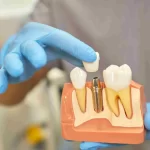It has been well established that dental implants are cosmetically and functionally superior to dentures and dental bridges. When it comes to finding a suitable and permanent replacement for missing teeth, dental implants are a winning bet each time. However, a lot of people hesitate before going down the dental implant route. For starters, it can be a hefty investment on your pocket. On top of that, a dental implant procedure rarely yields immediate results and can take months for completion. But overall, the benefits of far outweigh its disadvantages. So before you look up the internet for a ‘dental implant dentist near me’, it is beneficial to know the details about the procedure.

What are Dental Implants?
Dental implants are a type of restoration that serve as a replacement for missing teeth. It consists of two main components – a metal or ceramic anchor post that is drilled into the jawbone to take the place of the tooth root, and a dental crown that is mounted onto the post to replace the missing tooth. The anchor post is most commonly made of titanium, which is a biocompatible metal and has the highest success rate. The dental crown is designed to look as close to the natural tooth as possible in order to maintain the aesthetic value of the smile.
What Happens in a Dental Implant Procedure?
- The first step to all dental implant procedures is a thorough initial evaluation to decide whether the patient is a good candidate for the treatment. It includes oral and general health examinations, and diagnostic procedures like X-rays, CT scans etc.
- People with diabetes, osteoporosis etc. are generally not considered to be suitable candidates for dental implants. Some patients may require an additional bone graft surgery to augment the quantity and quality of their jawbone.
- Once the patient has been deemed to fit to receive dental implants, they are scheduled for the surgery. The surgery is minor and usually takes place under local anaesthesia as an outpatient procedure. On some occasions, the dental surgeon may consider it more beneficial to do the procedure under general anaesthesia, although this is rare.
- During the surgery, the dental implant post is drilled into the jawbone, in the spot where the missing tooth root used to be. The wound is then sutured and left to heal. There is usually a wait period of 3-5 months after the dental implant surgery. This is done to ensure that the implant has adequate time to integrate into the surrounding jawbone. This process is known as osseointegration and is the most important deciding factor in the success of the dental implant procedure.
- After successful osseointegration has taken place, the abutment screws can be placed onto the dental implant. These abutments serve as a connector between the implant and the dental crown. The wound is sutured once again and the wound is left to heal.
- After another wait period of a few weeks, the dental crown is fabricated and mounted onto the dental implant. The patient can begin to use their dental implants just as they would use their natural teeth while eating and talking. Although a few post-procedure instructions need to be followed to prevent added load on the implants.
Types of Dental Implants
There are two types of implants used in dentistry. The most commonly used type is known as Endosteal Implant. In this type, the dental implant is directly placed into the jawbone and allowed to integrate with the bone. A dental crown placed onto the implant serves as the artificial tooth that will replace the missing tooth in the mouth.
A less commonly used type is the Subperiosteal Implant. People with insufficient quality and quantity of bone are the primary candidates chosen for these type of implants. Instead of placing the implant into the jawbone, a metal framework is fitted onto the jawbone beneath the gum tissue. The implant posts are then attached to this frame, followed by the dental crown mounted onto the posts. The success rate of these type of implants has not been very good, and they are usually no longer used.
Advantages of Dental Implants
Compared to traditional methods of tooth replacement like dentures and bridges, dental implants hold several advantages:
- Since they are anchored into the jawbone, dental implants do not shift or move while eating or talking. This negates the need to worry about your artificial teeth embarrassingly falling out when you are in public.
- Unlike dentures, dental implants do not need additional cleaning measures or overnight soaking. They can be cleaned exactly like you would clean your natural teeth by regular brushing and flossing.
- Eating certain foods with traditional dentures and bridges can be cumbersome. With dental implants, you can eat and enjoy almost any food that you would want to with your natural teeth.
- Dental implants also have the longest lifespan amongst all types of tooth replacement options. When taken care of and maintained properly, dental implants can last almost a lifetime.
Cost of Dental Implants
One of the major drawbacks of dental implants that keeps people from investing in them is their Cost. On an average, a single dental implant can cost anywhere from $3000-$4500. If you need more than one implant or a replacement for a complete denture, this procedure can set you back tens of thousands of dollars.
While it may seem like a major investment initially, the benefits of dental implants make them a worthy choice when looking for tooth replacement options. Moreover, dental implants rarely require a replacement when the procedure is done well. This, in turn, saves you more money that you would otherwise spend on frequently replacing dentures and bridges.
There are also options available with financing dental implants. A lot of dental insurance companies now offer partial coverage for dental implants, where you only pay a relatively small amount out of your pocket. There are also payment plans available at most dental clinics wherein you can opt to pay the amount over a period of time instead of all at once.
At Minneapolis Dental, we believe in the practice of gentle dentistry and give primary importance to our patient’s comfort. Visit our dental office for all your queries about dental implants and allow our expert staff to take care of you.

















